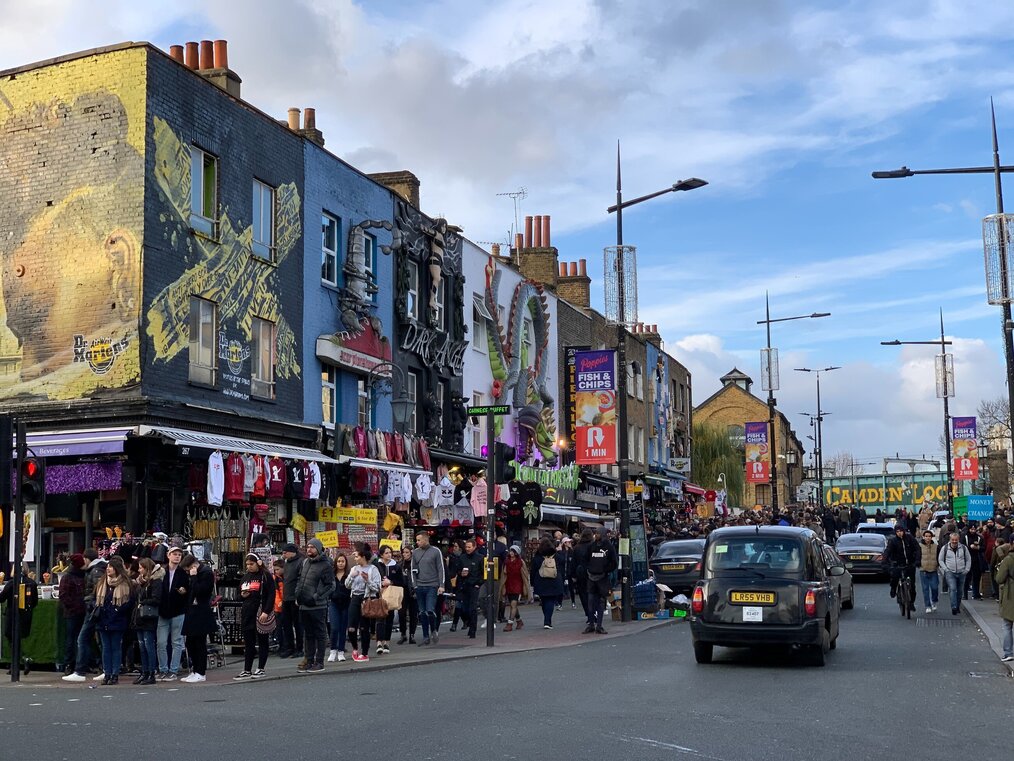How to Study Abroad in England on a Budget
England is a popular destination for international students but costs can add up quickly during a semester or year abroad. Read on to discover the many ways you can study abroad in England on a budget -- your wallet will thank you!

Studying abroad in England is a dream come true for many. Whether you’re hitting the books and the fast-paced metropolitan streets of the big cities or taking to the historic countryside, it’s easy to be caught up in the romance and down-to-earth charm of merry old England. With so much to see and do (on top of your studies!), it’s wise to determine ahead of time how you’re going to pace yourself, not only in reference to your time but your money as well.
I had known since the age of fourteen that I wanted to study at the University of Oxford, but as I got closer to that possibility, I knew that getting accepted to study there even for a term would only be part of the difficulty of making that dream a reality. As one of the more expensive cities for foreign students, Oxford was a good teacher in helping me learn some tools for managing a budget and showing me how to enjoy my study abroad experience in ways I didn’t expect.
Whether you’re studying in the City of Dreaming Spires or elsewhere, there are some simple steps you can take to make sure that you can make the most of your time in England without breaking the bank.
How much does it cost to study abroad in England?
First things first, how much can you expect to spend during your study abroad? Even though we have an entire article devoted to this, we'll break down the basics for you.
University costs
- Average cost through a third-party provider (includes housing): $17,000-$20,000 per semester
- Average cost through direct enrollment (does not include housing): $10,000-$14,000 per semester
Monthly cost of living
- Rent for room in shared apartment: $550-$800
- Utilities: $55-$70
- Groceries: $200-$250
- Cell phone plan: $15-$30
- Transportation pass: $45-$70
Source: Conventry University
Read more: How Much Does it Cost to Study Abroad in England?
Apply for grants & scholarships

Luckily, because England is one of the most popular study abroad destinations, there are no shortage of grants and scholarships open to international students demonstrating financial need, interested in specific fields of study, or looking for career-oriented internships. A wide range of assistance is available from foundations and programs seeking to give international students the opportunity to pursue academic studies in England. There are also several general study abroad scholarships open for applications.
Prestigious awards such as the Rhodes Scholarship and study awards from the Winston Churchill Foundation of the United States are able to provide substantial support for international students. Don’t overlook scholarships offered by your own university or other programs that can assist you through stipends or smaller awards, though. Many of these applications require a written statement about why you would like to study abroad, but with a little extra work on your part, you may be able to have a significant portion of your expenses taken care of. More information about some of the available scholarships can be found on the UK Council for International Student Affairs' website.
Go Overseas also has a great list of study abroad scholarships and grants, including opportunities for BIPOC students, to get you started on your research.
Read more: Everything You Need to Know About Study Abroad Financial Aid
Consider going through a program provider
Going through a program provider could save you some money, even though it seems the upfront cost comes with a big price tag. Program providers charge a fee that usually covers tuition and housing. Depending on the program, books and materials, a phone SIM card, and excursions may also be included.
To see what you can save, try plugging the costs for direct enrollment and a third-party provider into our cost comparison tool.
Read more: The Ultimate Guide to Studying Abroad Through Direct Enrollment
Keep track of your spending
Before you get to England, you'll need to know how much you'll need to spend each month. That way, you can understand where you have some wiggle room. There's only one way to do that: you've got to make a budget and stick to it.
Sitting down and writing out a budget either before you arrive is key. You should be sure to write out your budget in both Great British pounds (GBP) and your home currency, that way you know how much you’re spending in both. It is easy to forget how much things are really costing you in your home currency when you are only seeing prices in GBP.
The main categories you want to include in your budget are: groceries, daily transportation, travel/trips, laundry, and phone plan. Write out a monthly budget first and then break that down into a weekly one. My personal favorite way to stay on budget is getting out the amount of money I budgeted for myself from the ATM at the beginning of every month and then only using that, keeping my card for emergencies only. This also helps to avoid pesky bank fees.
Keeping a daily log of your expenses while you’re in England will help you stay on top of your budget. While you can do this by hand, spending tracker apps like Mint sync with your bank and classify your expenditures so you can visualize your habits. If you find you’re managing your budget well, you might find you can spend a little more for a special meal or day trip.
Check out our tool to help you start planning: Study abroad budget template
International bank fees
Another step you can take before you go overseas is to learn how your bank handles international fees. It isn’t unusual for financial institutions (including credit card companies) to charge foreign transaction fees, meaning you will pay a little extra every time you use an ATM or your credit card.
If you’re able to apply for a new credit card, there are traveler-friendly options that offer zero foreign transaction fees. If you are bringing cash, be aware that you might not get the best exchange rate from an airport currency exchange. You might consider opening a student bank account while you’re in England if you’re there for an extended amount of time. You can easily transfer money from your home bank to your English account using Wise which charges low fees and has a consistently good exchange rate.
One of the first things you might notice when you arrive is that the cost of everyday items is more expensive than what you might find at home. Don’t forget that currency exchange rates are changing all the time, and what seems low in British pounds might actually be pricey if you convert the price into your home currency.
Get a local SIM
There are plenty of phone providers in England to choose from, and it can be overwhelming. From my experience, Three has good coverage and prices for pay-as-you-go SIM cards. For £10 ($13.50 USD) a month, you get 10 GB of data and unlimited texts, calls, and international roaming capabilities (for an extra fee). There's no credit check or contract to sign up -- simply top up your plan monthly.
If you want to weigh your options across multiple providers, check out Carphone Warehouse for help picking the best plan for you.
All this talk about SIM cards making your head spin? Have a read through our article on finding the best cell phone plan for study abroad in Europe. You'll learn what they are, how to unlock your current phone, and tips to make your data go farther.
Become a savvy shopper

When it comes to shopping, some costs will be recurring while other expenses will be upfront. Luckily, there are a wide array of discount stores to buy your food, housewares, and incidentals.
Groceries
When you get to England, you’ll want to experience authentic British dining and cuisine (and all those other great international restaurants, too). However, while it might be tempting to go out to the pub every night, it isn’t a good idea for your wallet. Pubs are expensive and can quickly eat up your money, so I’d recommend dropping in only once in a while for quiz night. Other restaurants, even fast-food chains, can be equally costly. An easy solution for cutting down on this part of your costs while studying overseas is to cook for yourself.
Shopping at your neighborhood grocery store is a great way to save money and live like a local. Additionally, farmers markets are common in England, and you can find almost anything you need from fish to fresh cheese from the farm. Market prices are often even better than what you’ll find at the supermarket, so bring a basket or bag and try your hand at making British classics such as shepherd’s pie or bangers and mash.
Buying groceries will be a necessity while here, and there are plenty of stores to choose from, but it is good to know which ones will get you the best deals. Lidl, Aldi, Asda, and Tesco are the best options for students. They are among the cheapest of the main grocery stores in England and have everything you’ll need. In grocery stores, you may see aisles with American snacks and although they are tempting, they are also insanely overpriced. Try to avoid buying any American brand snacks and stick to English ones that are cheaper and often times just as good or better.
Homegoods
If you are staying in a flat or student housing and need homeware items when you first arrive, your best options will be Primark or Poundland. Primark is great for bedding, towels, shower curtains, and decorations while Poundland will have kitchen necessities like cups, cutlery, plates, and bowls. You can expect to pay $15 for a single duvet and $6 for two pillows. Four plates and four cups will cost around $4 each.
Beauty, toiletries, and pharmacy
For toiletry items, the best shops are Boots and Superdrug. Here, basic shampoo will cost around $2.50, and toothpaste and deodorant around $2. Don't forget to sign up for the Boots Advantage Card or the Superdrug Health & Beautycard for extra savings.
When you first arrive it is normal to be spending more in the first couple weeks than you will the rest of your time here since you will most likely be buying some kitchen and homeware items while you get settled. It is important to remind yourself that those are all one-time purchases and you won’t be spending as much later on.
Enjoy cheap entertainment
While you’re studying abroad in England, there will be no shortage of activities and events for you to enjoy. Most museums have no charge for admission, so you can walk right into the British Museum, The National Gallery, or the Ashmolean and enjoy hours among the exhibits. If you study in Oxford like I did, you can gain access to the oldest branches of the Bodleian Library and portions of historic buildings tours never visit. Every town has history and stories tucked away in its streets.
Many cities (especially if they are university towns) will have events almost every night, offering concerts on the lawn, choir performances, and plays. Often, students can attend these with little to no cost. You can find out about these offerings locally or through websites like Eventbrite. Again, don’t forget your International Student Identity Card for discounted musical and other entertainment tickets. If you are studying through a British university, you might have the opportunity to join student clubs and societies. You can also find local activities for like-minded people through Meetup. Parks and walking paths, too, are plentiful in England and make excellent getaways for picnics and quiet hikes.
Thankfully most places in England understand that students are almost always living on a budget and will offer student discounts. Always be sure to bring your student ID card everywhere, and even if there isn’t a discount obviously advertised just ask and there’s likely to be one. Student discounts may also be referred to as the concession price. For instance, when buying movie tickets this will apply to students with a valid student card.
Take advantage of low-cost travel options

You'll undoubtedly want to do a bit of travel while across the pond, both around the British Isles and further afield. Our tips will help you save a few quid while you explore.
In the UK
A broad network of buses, underground stations, and trains make getting around in England almost too easy. Travelers to England have options when it comes to discounted transportation, such as the BritRail Pass, and students can receive exclusive discounts using their university I.D. cards. Be sure to sign up and take advantage of the International Student Identity Card, which not only gives you discounts for travel but food and entertainment as well!
Some major university cities with student discounts for local travel include:
In many cities, all you will need to get around quickly and cheaply is a railcard and a tube map. In some places, you might be able to rent a bicycle to make getting around easier. In addition to these options, you can also partake in one of England’s most popular outdoor activities and walk. You’ll not only gain the health benefits from trekking to and fro but also you’ll get to explore your city and discover its hidden treasures in ways you can’t while sitting on a bus seat.
The rest of Europe and beyond
The first thing to know about traveling around Europe while studying in England is that there is absolutely no pressure to do so if you don’t want to (or can’t afford to). If you have room in your budget and want to travel outside of England the best place to find cheap plane tickets is Skyscanner and for cheap train tickets use Trainline. To compare train vs. bus vs. flight prices for the same route at the same time, my favorite transport comparison website and app is Omio.
There are multiple airports in London and often Heathrow is really expensive to travel in and out of, try to fly out of the smaller airports (like Gatwick, Stansted, Luton, or City Airport) -- but make sure to account for traveling to and from the airports before booking your tickets. Ryanair and easyJet do inexpensive flights from other cities across England -- just be sure to check baggage limits with discount airlines as they often rope you in with dirt cheap tickets and then stick you with expensive baggage fees.
Live your best life on a budget in England
When studying abroad in England, it’s hard not to feel like you need to take tea at every café and attend every performance in order to get the most out of your time abroad. However, with a little bit of planning upfront, you can enhance that time by making informed choices about what you’ll spend money on. In the end, you might find that your most priceless experiences came without price tags.
What to read next: How to Get a Student Visa for Study Abroad
